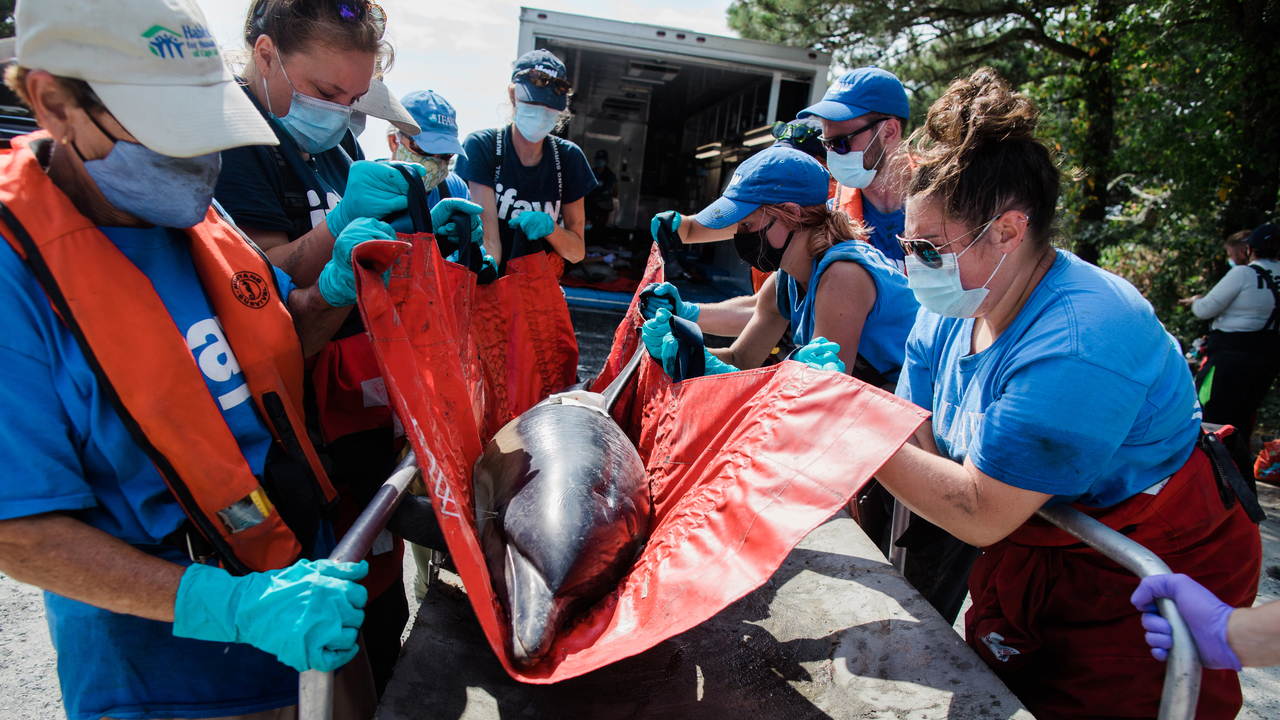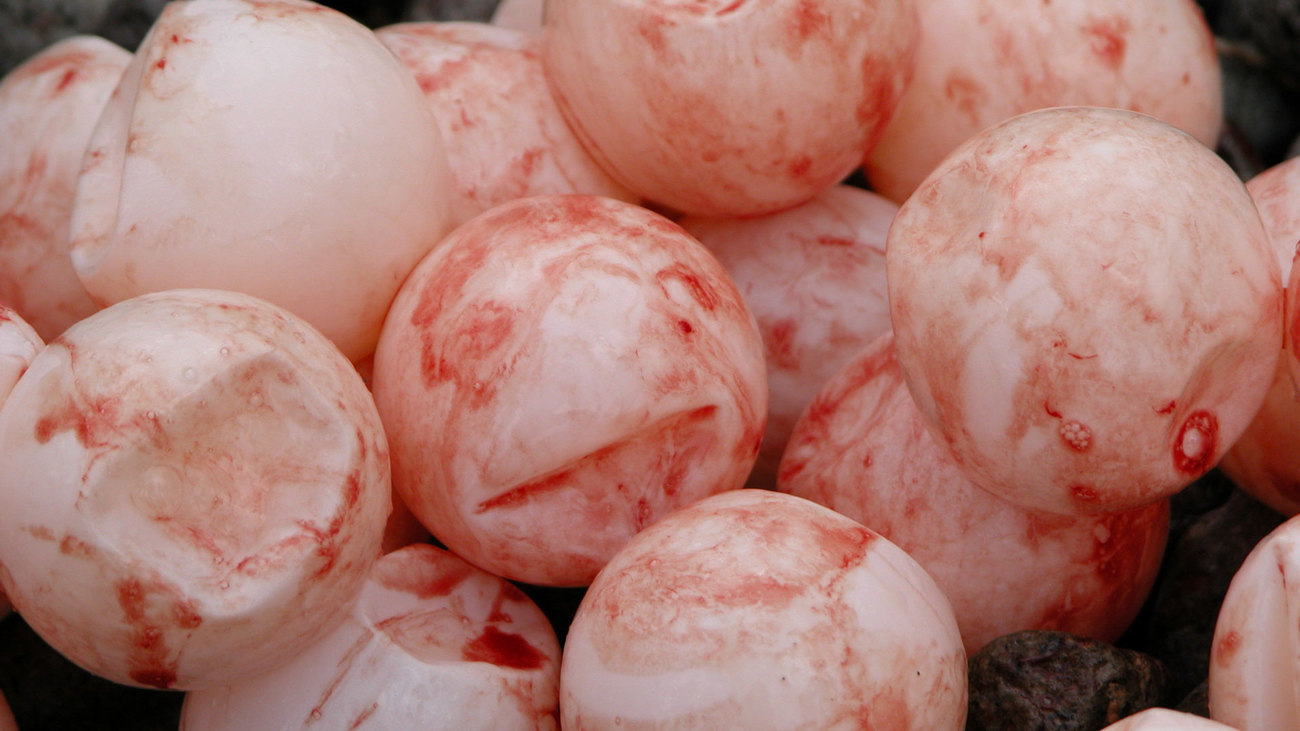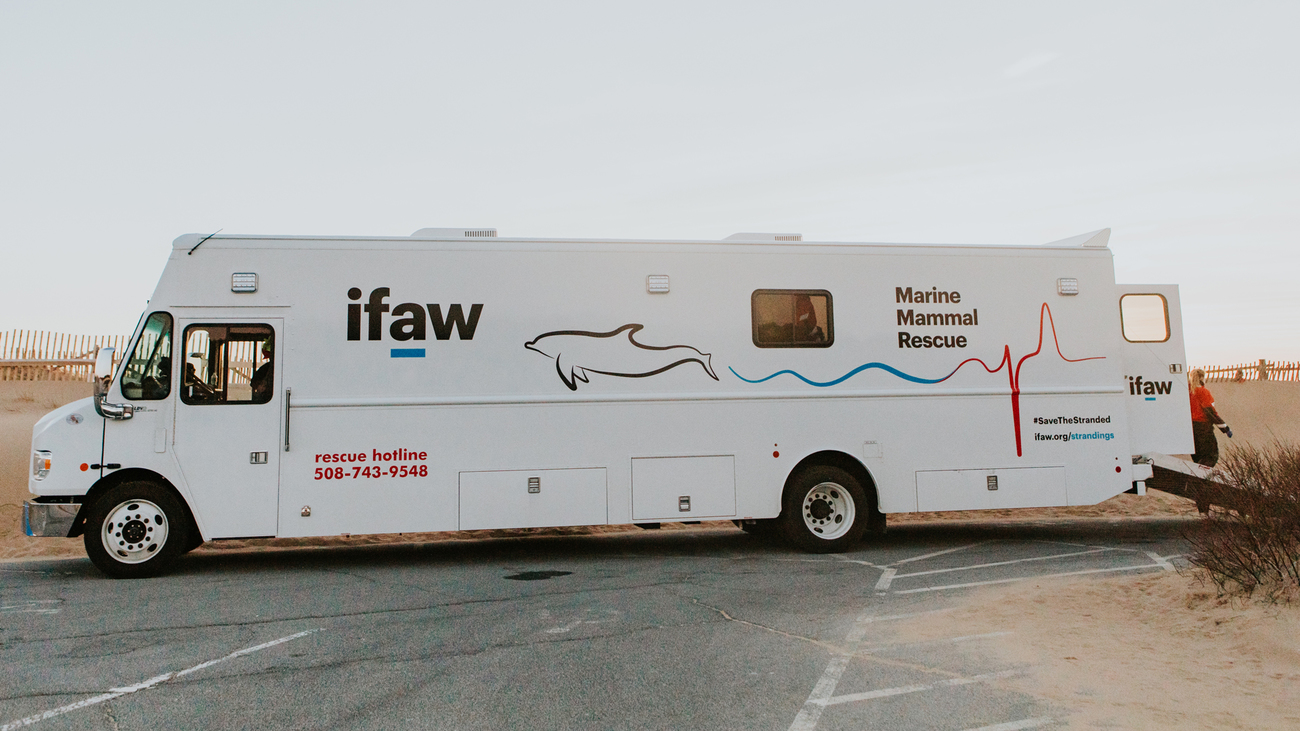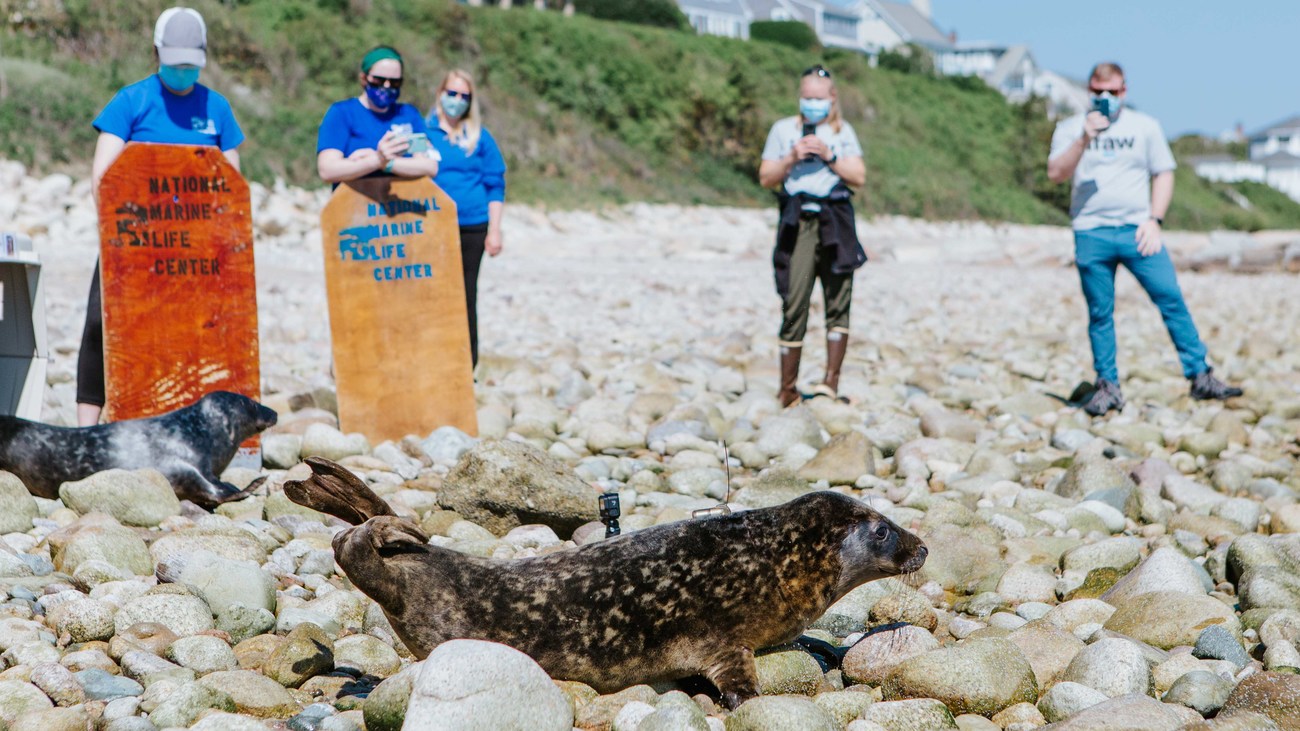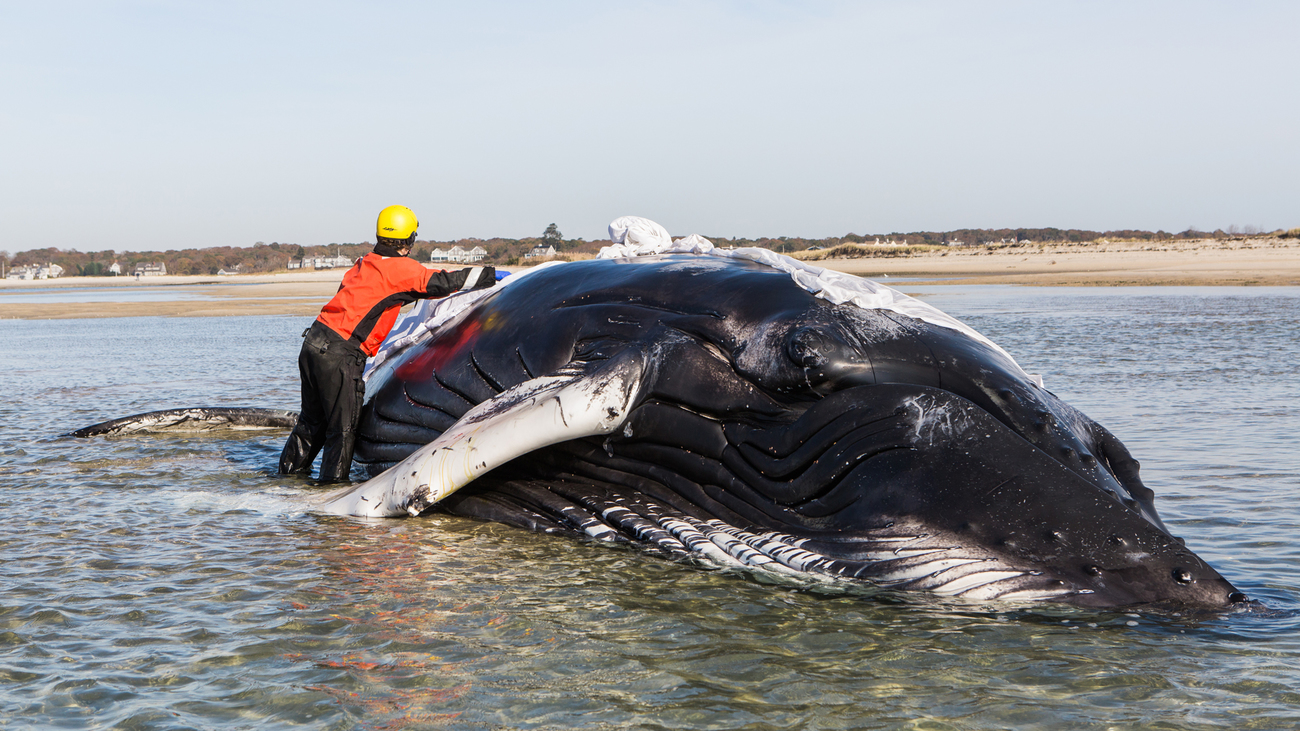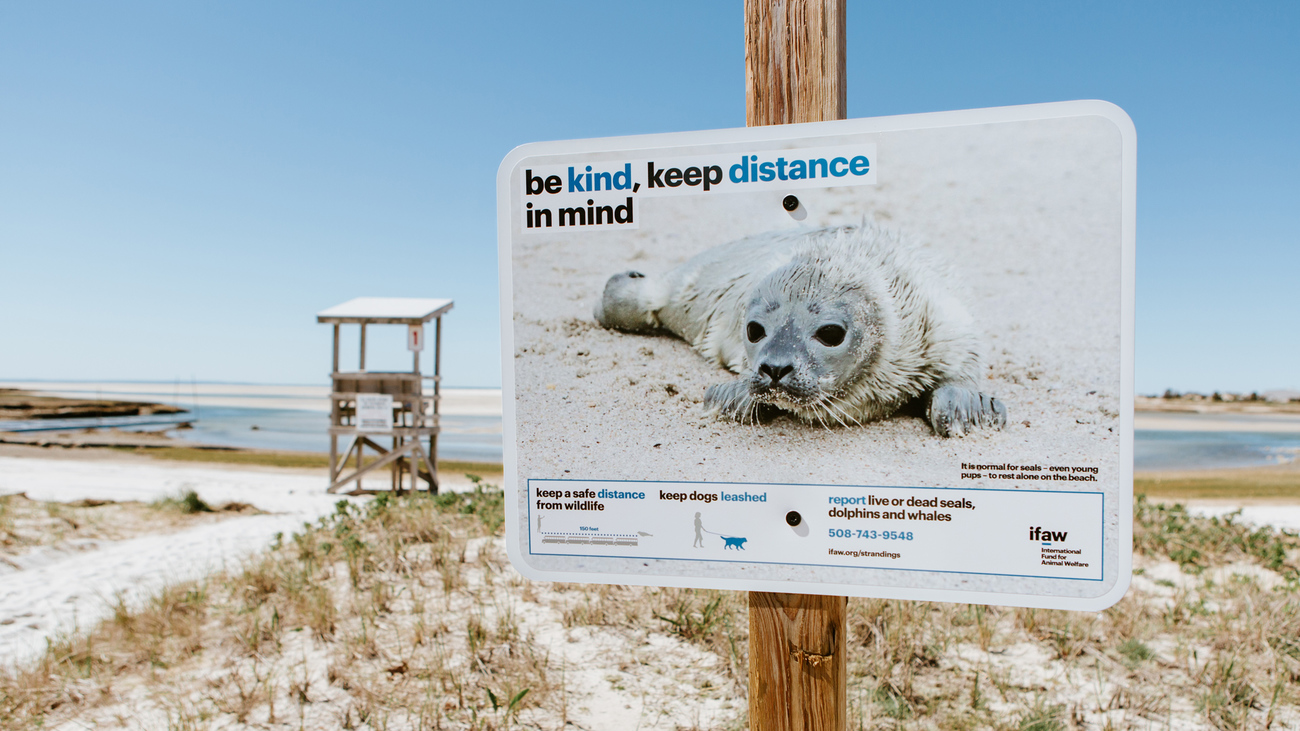marine mammal rescue
marine mammal rescue
IFAW’s Marine Mammal Rescue & Research (MMRR) programme is a world-recognised leader in stranding response. No location in the world sees more frequent mass strandings of dolphins than Cape Cod, Massachusetts, where IFAW’s MMRR team is based. These events are not only a unique opportunity to rescue and provide cutting-edge veterinary care to these individual animals, but also to drive constant innovation and ground-breaking research that is shared with collaborators from around the world. This is a team of both local action and global impact.
In FY21, the team responded to 386 stranded marine mammals. This included responses to 137 live small cetaceans (including small whales, dolphins and porpoises), 106 of which were released back into the wild.
In addition to our hands-on work, IFAW’s MMRR team trained and assisted other international response teams, thus improving the welfare, treatment and veterinary care of stranded marine mammals around the world. We also regularly engage and train passionate members of local communities to support rescue efforts as volunteer responders. It’s a testament to what can be achieved for animals when we work together with the people living closest to them.
Photos in this section are of activities conducted under a federal stranding agreement between IFAW and National Marine Fisheries Service (NMFS) under the Marine Mammal Protection Act (MMPA).
a rescue story unlike any other: a 45-dolphin mass stranding event
In August 2020, IFAW’s MMRR team responded to a report of a mass stranding in one of the trickiest areas of Wellfleet, Cape Cod, Massachusetts, a notorious stranding hotspot because of its hook-shaped topography and extreme tides. The team quickly realised the scope was one of the largest single events in its 23-year history of marine mammal rescue—45 dolphins were out of water and exposed to the summer sun and heat. Sadly, two had already died.
The team had to act quickly. It was not feasible to extract all 43 living animals from the mud and transport them to a more favourable location with open ocean access as is typically done. Instead, trained staff and volunteers had to quickly and skillfully adapt to the situation at hand.
The team worked tirelessly to extract the least stable animals two at a time, managing to get 11 animals into the veterinary trailer for much-needed clinical care. Due to the heat of the day and shock resulting from the stranding event, two animals had to be humanely euthanised to prevent further suffering.
At the same time, the team was providing supportive care to those animals still at the stranding site. Soon the tide changed and water returned enough that most of the dolphins were starting to refloat. They re-acclimated and started to swim on their own with the rising tide. Although the group was now swimming once again, the team knew that if they stayed in this precarious area, there was a good chance they might strand again. In order to give the dolphins the best chance of survival, response vessels were used to carefully herd them out to deeper water.
Despite the traumatic impacts of the stranding event, nine of the dolphins brought into the mobile clinic for care were deemed good release candidates and were transported to a suitable release location with easy access to deep water. Exhausted yet determined, responders brought each animal down to the beach and released them back into the ocean.
As they swam off, every challenge faced that day faded away as the team watched nine remarkable, resilient animals swim out toward deeper waters and hopefully toward a successful second chance.
rescuing marine life across Oceania
We continue to work closely with marine rescue organisations across New Zealandand Australia to ensure stranded or entangled marine mammals are given the best chance of survival. Our relationship with the Organisation for the Rescue and Research of Cetaceans (ORRCA) in Australia is a long-standing one. We continue to support their rescue missions through advocacy and funding critical resources.
Across the ocean in New Zealand, our support for Project Jonah is ongoing as the team continues to respond to countless strandings every year. Our U.S–based, world-renowned MMRR team continues to share its expertise and offer advice to Project Jonah when needed. We are also collaborating on a first-of-its-kind satellite tagging project with Project Jonah, Massey University and the Department of Conservation. Through this collaboration, we hope to better understand the welfare outcomes of whales that have been released back into the ocean after a stranding.
Our marine work is not limited to mammals—we have also been supporting the rescue, rehabilitation and release of injured seabirds and sea turtles with our friends Australian Seabird Rescue. Plastic continues to have a significant impact on marine life with the number of sea turtles coming into care as a result of ingestion or entanglements increasing more than 12-fold for the team over the past two years. We provide Australian Seabird Rescue with vital resources to help rehabilitate these animals and increase their chances of being successfully released into the ocean where they belong.
the first-of-its-kind mobile veterinary clinic for marine mammals
After years of customising, testing and improvising with available equipment—and thanks to donor support in FY20—the IFAW MMRR team officially deployed “Moby,” a custom mobile veterinary clinic for marine mammals.
This one-of-a-kind vehicle took three years to design and build, merging IFAW’s extensive experience and understanding of the needs in marine mammal rescue with the brain trust of LDV, a company that builds incident command vehicles for first responders.
Moby was put to the test immediately after it arrived. The MMRR team was incredibly busy in March 2021, fondly referred to as “March madness” with more than 70 cases in a single month. In just one event, a total of nine common dolphins were transported together, given full health assessments and treated for dehydration and shock while on the road to a safer open-ocean release site. Thanks to Moby, dolphin pods such as these can be rescued together, thereby allowing them to survive and thrive together.
rescuing, rehabilitating and releasing entangled seals
IFAW’s MMRR team has pioneered new techniques to help rescue gray seals entangled in fishing gear. Tight wraps of netting around a seal’s neck become deadly as the seals grow and the gear cuts deeper. Our team intervenes to remotely sedate these animals so that they can be captured, disentangled and treated before being released back to the wild.
These are the first-ever operations of their kind for seals and have mitigated negative human impacts to individual animals and their populations, improving animal welfare and supporting conservation.
In March 2021, IFAW’s MMRR team rescued a juvenile gray seal entangled in a heavy fishing net in the Cape Cod Canal. After disentanglement and a health assessment, he was taken to IFAW partners at the National Marine Life Center’s rehabilitation hospital, where he more than doubled his weight from the time of rescue—to almost 45 kilograms (95 pounds)!
Atlas, named for the Titan forced to bear the weight of the heavens on his shoulders, was ready to be released in May 2021. He appeared healthy, robust and wasted little time making his way back to his ocean home. The hope is that Atlas will use the productive waters throughout the Gulf of Maine, or he may decide to travel to other regions as well. With a temporary, specially-designed seal satellite tag, we tracked his movements in the initial weeks after his release and generated worldwide buzz as part of our Back to the Wild campaign.
large whales: always-on response and readiness
IFAW’s ongoing response work for marine mammal rescue relies on constantly being prepared to deploy in the case of large whale strandings, rescue and disentanglement events.
In January 2020, following years of preparation, testing and practice, our MMRR team put our large whale remote drug delivery system to work for the first time. As part of a team convened by U.S. National Oceanic & Atmospheric Administration (NOAA), IFAW staff deployed to Florida to successfully administer antibiotics to an injured newborn right whale calf that had been the victim of a ship strike. This was a groundbreaking event, as it was the first operation to remotely administer medication to a right whale calf. The species is one of the most endangered animals in the world, with fewer than 336 now remaining, and every individual matters more than ever.
Our teams always strive to learn from all responses, even those that have a negative outcome, so that we can innovate for the future. In November 2020, IFAW’s MMRR team responded to a stranded humpback whale calf off Chatham, Massachusetts. Despite all the efforts of the team, the whale died, but the event prompted the team to look for new methods to rescue large whales. Weather and tide conditions were challenging, and the clock was ticking, but the animal otherwise appeared healthy. How might new efforts and solutions help in the future?
In May 2021, attempts were made to herd a pilot whale out of a shallow cove off New Bedford, Massachusetts. Eventually the whale stranded, and Dr. Sarah Sharp’s examination further revealed its poor condition. Euthanasia was determined to be the most humane option, and analysis of the samples collected from the necropsy help to further our understanding in conserving these incredible animals.
The team has not solved every challenge these animals face, but continuing our work helps drive constant innovation and groundbreaking research that can be shared with collaborators around the world.
sharing knowledge for animal welfare
Seal coexistence on 100 Cape Cod beaches
IFAW has provided beaches across Cape Cod, U.S., with signs that explain how people can enjoy the beach without disturbing wildlife. A total of 100 signs have been distributed to 14 towns and the Cape Cod National Seashore, a division of the U.S. National Parks Service. Through greater awareness of seal behaviour and habitat, the initiative aims to inspire community conversations around coexistence rather than conflict, understanding how to live harmoniously with wildlife in a human-dominated world.
International training brings success in Oman
Through the years IFAW’s MMRR team has trained and advised response teams in more than 16 countries around the world, improving the welfare, rescue techniques and veterinary care provided to stranded marine mammals. Five years after IFAW and the International Whaling Commission held disentanglement training in Oman, the country’s Environment Authority successfully disentangled an endangered Arabian humpback whale in the Arabian Sea in January 2021. The whale was seen safely swimming back in deeper waters—a tremendous achievement made possible through collaboration.
Online veterinary education
In a continued effort to share IFAW expertise with the next generation, the MMRR team invested in video production of a complete dolphin necropsy (animal autopsy) for educational purposes via such groups as Cornell University’s top-tier Aquavet training platform and beyond. The video will help train students, stranding responders and veterinarians around the world for years to come.
Stay in the know. Be ready to act.
You’ll receive news, updates on activities and on future giving opportunities. You can unsubscribe at any time.